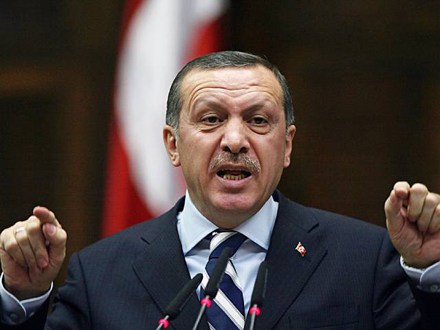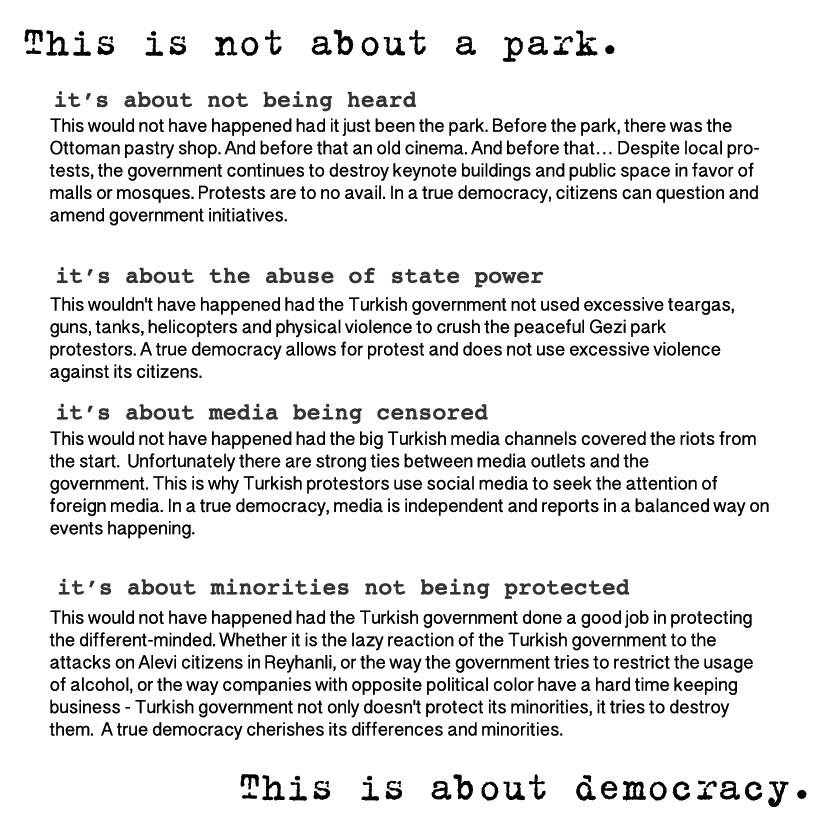If there are messages sent out by the days-long "park revolt" starting from İstanbul and spilling over to other cities, their address is, exclusively, Turkey's prime minister, Recep Tayyip Erdoğan.

"Turkey's leaders, Erdogan chief among them, are learning that they can't do exactly as they please without being challenged" wrote Binnaz Saktanber, in an article for the Guardian. It is a loud, public outcry of "just a minute!" for an imposing display of a swelling ego, of "intoxication of power," a term some devout-reform circles coined about Erdoğan not long ago.
It did not have to come this far, but various psychosocial elements have overlapped and built-up, and the tipping point has been reached. The first and most important point was about the rapidly surfacing pattern of "unconditional obedience" around Erdoğan.
Despite a series of friendly warnings from outside the Justice and Development Party (AKP), the party's remaining bulk of "wise people" -- the founding clique -- feel too intimidated to negotiate, question and stand up to the willful chairman. As is well known from the history of politics, such a top-down method of managing politics invites only flunkeyism, nothing else.
Given the zigzags of conduct since the 2011 national elections, it certainly looks like these elements have caused Recep Tayyip Erdoğan to lose touch with reality, to become distracted and misled (and to act erratically, as he does now, in the case of Gezi Park protests). This has only fed his delusions of grandeur, which may help explain his rejection of reflecting over the real causes of the urban revolt.The developing events prove that it is about him and not much about the movement that he leads.
So, the first issue is whether or not he will lend an ear to benevolent dissent in his party and from outside in order to regain his touch with reality.
So far, the opposite happens.
In the course of 36 hours Erdoğan only sought to find the causes, and managed to identify all of them as "two-three marauders," "extremist fringe," "foreign agents," "ideological types," "deep state elements," and, of course, the social media -- which he defined as "menace for the societies." It is, obviously, all but not about him.The second point has to do with the mandate he has been given ever since 2002 and why he is still so popular.
If the AKP is still, after a decade, so popular with the masses, it is because it is seen as the vehicle to reach the destination of full democracy. The voters -- extending way beyond a pious mass -- have renewed their support each time they went to the ballot boxes because they believe that Erdoğan should be the driver to complete that journey with success.
The votes since 2002 have been all about a mission -- not only for a powerful economy -- but also for rule of law, justice, freedom, equality and peaceful coexistence.
And most of all, human dignity and respect for one another. The people of Turkey are fed up with being treated like a herd of cattle over the decades, and want to decide their own destiny in social serenity, without fear, making peace with each other and move on.
Erdoğan, however, has particularly since the last national elections 2011 adopted an approach of neo-tutelage n and has gotten fiercely engaged in a frustrating micromanagement of lifestyles, while dictating cultural patterns. He is widely perceived as giving priority to "moral majority values", to the cost of others, delaying the demands of the minorities and diverse social groups, causing disappointment, fear and alienation.
In spite of advice, warnings and signs by what remains of the independent media pundits, he has escalated his paternalism, pushing last year (unsuccessfully) for an abortion ban, lashing out at a popular series on Ottoman Sultan Suleyman the Magnificent as "demeaning our history", telling constantly every family to have at least three children, drink "ayran" (a national yoghurt-water mix), endorse a municipality ban on couples kissing each other in metro stations (which led to Islamist mobs attacking protesters of the ban kissing each other with knives and machetes), and, lately, a restriction of alcohol sales, consumption and ads, more on the grounds of religion than health and security.
Furthermore, he escalated the tension, by humiliating some social segments, saying, "Go home and drink your alcohol there!" or referring to youth as "drunkard youngsters." Polarization, already a part of Turkish public domain, reached a peak, backfiring -- and a social eruption with the Park as a pretext was a fact.
The protesters are composed mainly of an "E Generation": urban youth between 15 - 25, who have grown with Erdoğan in power, first as Mayor of Istanbul, then as Prime Minister, since 1994. It has a lot to with "Erdoğan fatigue" as well.
It has to do, much more specifically for many other urbanites, with the "10 Year Rule", which were related to the cases of Thatcher, Kohl or Blair. No matter how successful a political leader may be, people want to see new faces. But, in the case Erdoğan, there is no alternative. This explains also why the "One Minute Movement" is impulsive, disorganized and not owned by any ideology.
The crucial question is whether Erdoğan will return to humility, reflect, listen to wise guidance and digest his errors.
There is at the moment, not much room for optimism. Defying expectations Erdoğan has chosen to escalate the tensions even higher, infuriating more people as also the mildly pious segments also shows signs of alienation.
Unless he changes his arrogant and paternalistic ways, and reshuffle his close circle of advisors who apparently build walls between him and the reality. Another broad picture is as described by Bülent Keneş, Editor of daily Today's Zaman, in an article.
"The AKP has today come to be associated with giant construction projects in Istanbul and other cities that pay no regard to the environment in an effort to create benefits and revenues for certain self-seeking supporters" he wrote.
Broad social groups that have continued until recently to lend support to the AKP in the face of challenges from anti-democratic groups have started to believe that the ruling party is no longer a reformist or democratizing party, but has become a center of distribution of lucre. Despite serious opposition from various segments of society, the self-conceited and controversial moves from the government such as the project to rebuild Gezi Park, the reductions in the penalties for corruption in public procurements, the alcohol bill... have aggravated people's concerns about 'single man rule' and the government's tendency to grow more 'authoritarian.'
If Erdoğan remains defiant and threatening, it is his party that should be afraid as well: Chances of winning the municipality of İstanbul are weaker, the Kurdish peace process is more vulnerable to sabotage and a new presidential system with Erdoğan on top may be a pipe-dream.

